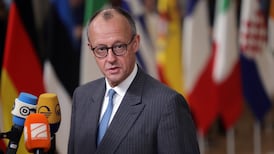Danes will vote in June on ending their country’s EU defence and security opt-out after Russia’s “pointless and brutal” attack on Ukraine.
Prime minister Mette Frederiksen announced the June 1st vote alongside the “largest investment in Danish defence in recent times”. In the next decade, Copenhagen will increase its defence spending by 18 billion Danish kroner (€2.4 billion) annually to reach its Nato spending obligation of 2 per cent of gross domestic product.
In addition, Copenhagen will spend seven billion kroner (€940 million) in the next two years to strengthen Danish diplomacy and humanitarian efforts.
“Historic times call for historic decisions,” Ms Frederiksen said at a press briefing in Copenhagen. “[Russian president Vladimir] Putin’s pointless and brutal attack on Ukraine has heralded a new era in Europe, a new reality.”
The announcement, a week after a similar shift by Berlin, reflects growing alarm across northern Europe that Moscow’s invasion of Ukraine will not end there. As refugees flee their homeland, Ms Frederiksen said Ukraine’s struggle was “a test of strength for everything we believe in, our values, democracy, human rights, peace and freedom”.
It’s 30 years since Denmark secured an opt-out from the euro as well as EU’s Common Security and Defence Policy. Opting in to the latter next June would allow the country to take part in joint EU military operations and co-operate on the development and acquisition of weapons and military capabilities.
Military spending
A recent poll by TV2 showed 49 per cent of voters support joining the EU defence pact, while 27 per cent oppose.
The June 1st vote will be the third attempt to end opt-outs from the Maastricht Treaty, previously on the euro and on justice and home affairs.
Three years ago Denmark vowed to increase its military spending from 1.35 per cent of its economic output to 1.5 per cent. Facing growing pressure to meet Nato targets, Denmark will finance increased defence spending by easing budget restrictions and allow a deficit from 2025.
As well as boosting its defence capability, Ms Frederiksen agrees with Denmark’s main political leaders that the country needs to end its dependence on Russian gas “as soon as possible”.
The Danish move comes as Russia’s attack has prompted neighbouring Sweden and Finland to reassess their previous military non-alignment. Public support for Nato in the two non-member countries has surged in recent weeks, amid concerns they could be a target of Russian aggression.
A poll for Finnish state broadcaster YLE found 53 per cent of Finns favoured joining Nato, while 28 per cent were opposed.
A Swedish poll in late February for public broadcaster SVT found 41 per cent support for Nato membership, while 35 per cent were opposed.
Even before Russia’s invasion of Ukraine, both Sweden and Finland were increasingly nervous as Russia stepped up military operations in the Baltic Sea area. Leaders in Helsinki and Stockholm have insisted they will not yield to pressure to join the alliance – or, as Russia demands, to stay out – but will wait for their own people to decide.














